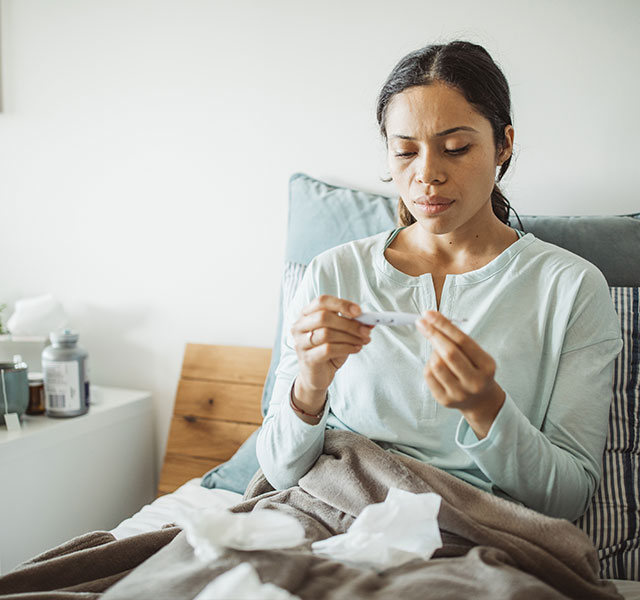If you come down with a mild case of COVID-19 (meaning you aren’t having serious symptoms like shortness of breath) it’s best to nurse yourself back to health at home.
“Get plenty of rest and drink lots of water, especially if you have a high fever, as it means you are dehydrated,” says Sana Zuberi, MD, a primary care physician with Henry Ford Health. “A rise in body temperature requires more water for the body to function properly. Drinking water doesn’t ‘flush out’ the virus, as some may think, but it helps your body work optimally so that it can fight off the virus.”
Replenishing your electrolytes—especially if you’ve been vomiting or have had diarrhea—is also important, Dr. Zuberi says. Try coconut water or Pedialyte, which Dr. Zuberi prefers over Gatorade, as it contains more sugar.
And while vitamin C in the form of fruits and vegetables is always recommended to boost immunity, there’s no miracle cure to help you quickly treat COVID-19. There are, however, over-the-counter medicines and remedies to help you feel more comfortable while the virus is taking its course.
Here, Dr. Zuberi shares the medicine that can help ease your pain.
- For a fever and body aches: Acetaminophen. Acetaminophen, such as Tylenol, can reduce fevers, aches and pains. Dr. Zuberi recommends Tylenol instead of pain relievers like aspirin. Aspirin is often combined with caffeine (in drugs like Excedrin) and can speed up your heart rate, which you especially don’t want when your body is working hard to battle a virus, she says. Follow the instructions on the label and don’t take more than the recommended amount.
- For nasal congestion: Antihistamines like Claritin or Allegra. Both of these options can reduce stuffiness and congestion, making you feel more comfortable. Again, follow the recommended dosage and do not over medicate.
- For a sore throat: An apple cider vinegar rinse. 3 or 4 times a day, mix half a teaspoon of apple cider vinegar in half a glass of water and gargle. Anecdotal evidence shows it may help soothe a sore throat, says Dr. Zuberi. (Just be sure to always dilute it with water, as gargling or drinking apple cider vinegar by itself can be too acidic and potent.)
- To aid recovery: Glutathione. Glutathione is an antioxidant that helps strengthen the immune system. Certain studies are starting to show that people who have low levels of glutathione in their body may have worse outcomes of COVID-19. “If you take glutathione, it could potentially help you recover more quickly from the virus,” says Dr. Zuberi. Glutathione is available in supplement form, and can also be found in vegetables like spinach, asparagus and broccoli.
As for a cough, you can try a cough medicine like Mucinex to thin mucus, but Dr. Zuberi recommends not taking anything. “It’s best, when you can, not to mask your symptoms too much, so you know how serious your condition is,” she says. Being conservative with medication will also help you know when you are getting better.
“I tell patients they should have no fever for 3 days straight, and lingering symptoms (like a cough and congestion) should be gone after a week—all without the help of any medication. That is generally the point in which you can say you’ve recovered from COVID-19.”
To learn more about COVID-19 symptoms, testing and what to do if you get sick, visit henryford.com/coronavirus or call 1-800-436-7936.
Dr. Sana Zuberi is a family medicine physician with Henry Ford Health. She sees patients at Henry Ford Medical Center in Plymouth.



